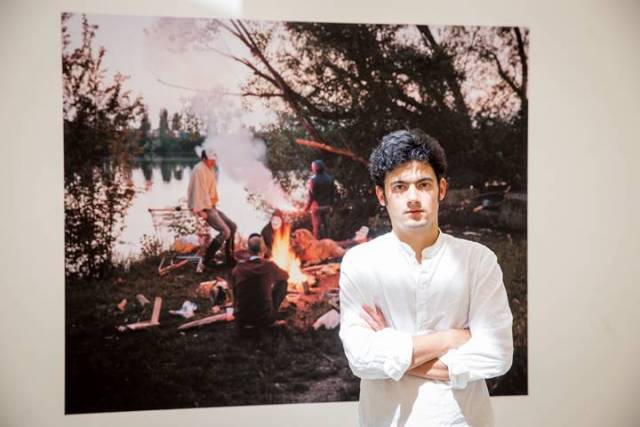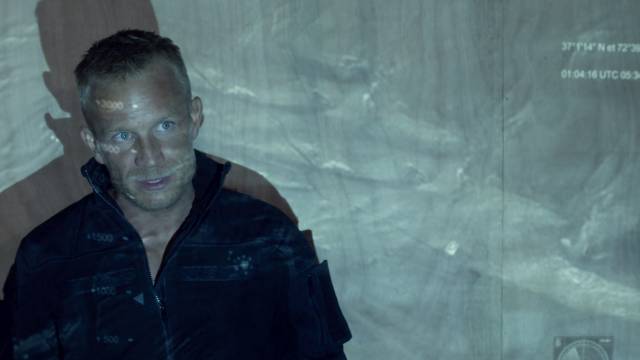
 In Clément Cogitore’s haunting Neither Heaven Nor Earth a group of French soldiers stationed in the Afghan desert face their worst enemy as members of the group begin mysteriously disappearing one by one. The absence of corpses or knowledge of the final destination of the soldiers creates existential chaos and threatens to destabilize the frail state of the company making for a unique film experience that’s part mutiny thriller, antiwar essay and supernatural drama. The film was a critical success at the 2015 Cannes Film Festival and is now making its commercial debut in the States. I spoke to director Cogitore about how he maintained the mystery of the film and his fascination with people in isolation.
In Clément Cogitore’s haunting Neither Heaven Nor Earth a group of French soldiers stationed in the Afghan desert face their worst enemy as members of the group begin mysteriously disappearing one by one. The absence of corpses or knowledge of the final destination of the soldiers creates existential chaos and threatens to destabilize the frail state of the company making for a unique film experience that’s part mutiny thriller, antiwar essay and supernatural drama. The film was a critical success at the 2015 Cannes Film Festival and is now making its commercial debut in the States. I spoke to director Cogitore about how he maintained the mystery of the film and his fascination with people in isolation.
I saw the film at the Florence Gould Hall Theater at FIAF, I’m not sure if you’ve ever been but it’s an underground theater, meaning that during several moments the space felt like the film, at the end I was so relieved to be going back upstairs and into the light. When you imagined the film, how important was it to you that it would be seen in theaters?
The movie theater space is really strong, it’s stronger than a DVD player or an iPad. The cave in the film, an empty space in which people are together is metaphoric of cinema.
Absolutely, watching station in the film made me think of film too. The soldiers look out through the windows creating their own films in a way. As an artist do you subscribe to the notion that the piece should allude to its medium?
I don’t like as a spectator to feel that I’m watching a film that is saying “this is about cinema”, so I wouldn’t want audiences at my film to think that. First of all it’s about human beings, as a filmmaker I’m talking about perception, but first I hope people are interested in the characters.
So you find more symbolic elements manifesting themselves unconsciously then?
Yeah, there were things in the script I was aware of, for instance when the Captain is trying to sleep in the outpost, the camera is filming him as he tries to fall asleep to make the phenomenon work. This to me is mise-en-scene, you’re trying to make something happen and capture it, but as soon as you try to control it too much you lose it. You need to give up yourself and not be afraid, when you’re afraid you start believing in the monster.
How much did you tell your actors about what was really happening in the plot? Did you solve the mystery for them? Do they know more than the audience?
No, they didn’t know more than the audience or even more than me. I just know what’s in the script, I wanted to show the experience of humans finding something unexplainable.
Did the actors try to solve it then?
(Laughs) No, there were two ways of finishing the film. There were French distributors who wanted to fund the film only if we changed the ending and showed a monster, they wanted a real genre film. But I did not want to do that, I wanted to show a metaphoric way of dealing with death or love, things you need to face. Mysteries you can’t solve but that exist nonetheless.
You’re saying you are interested in connections between humans, but in Among Us, your characters were illegal immigrants, in Bielutine you show us lonely people guarding art, and in this one we have soldiers in a far off land. What fascinates you about the idea of people being isolated?
That’s interesting because in a few weeks I’m going to go shoot a couple of projects in Siberia, they’re about two families living in a completely lost forest, it takes four days of travel to get there. I’m interested in how the community of people starts, and how rules emerge, how belief in the community is built. When you film people isolated these questions appear in a clear way.
Like they’re rebuilding the world.
Exactly, you take ten people and you can recreate humanity.
 In your installation Places you showed locations without any humans. What fascinates you about the places themselves, places untouched by men?
In your installation Places you showed locations without any humans. What fascinates you about the places themselves, places untouched by men?
The landscape is a remote place that will be so unfamiliar to us that our minds are open to receive a lot of information. In Neither Heaven Nor Earth there is a lot of information, the desert is a screen for your imagination as a filmmaker and a spectator.
Are we supposed to see any meaning in Jeremie Renier’s character being named Antares? After all, it was one of the four royal stars in Persia and undoubtedly it would be very prominent from where the soldiers were stranded.
Actually I chose the name before knowing about the star, which is also related to the Scorpio constellation. I loved the name, he could have been a hero in ancient literature, it’s a name connected to something ancient, so I wanted to give him this name because he’s a guy who knows how to fight.
It caught my attention that an underground cave became the focal point of Antares’ obsession because it made me think that both Osama bin Laden and Saddam Hussein were found hiding underground. Is your film in any way trying to point out how despite their best intentions the West was complicit in the destruction of the Middle East? Is it essentially a film about how France for instance should take responsibility in the repercussions of the invasion?
Not exactly, the idea was to tell a story, but since we’re in the West we tell it from the point of view of the soldiers. The idea was that little by little people realized soldiers from both sides had a lot in common. Both sides have a common enemy, as people begin to disappear, so they are forced to share information, becoming less “fighters” and more human. Their weapons become less and less useful.
Neither Heaven Nor Earth is now in theaters.